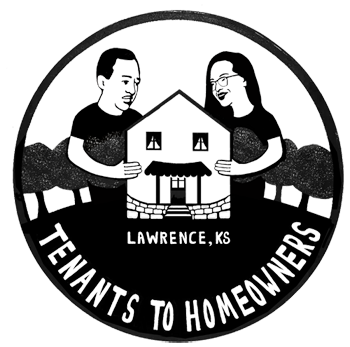Home Purchase Program Eligibility Requirements
Eligibility Requirements
- Complete all program steps.
- Meet income guidelines at or below 80% of Lawrence median income.
- Qualify for a home loan from a LCHT lender. This means you must have stable verifiable income, good credit and a low debt-to-income ratio.
- Have a credit score of 670 or higher (if your credit is not there now, we can help you work on it).
- No bankruptcies in the last 2 years.
- Good bill pay within the last 2 years.
Homes must be owner-occupied; LCHT does not subsidize landlords.
If you are unsure if you qualify or have questions about the program please call our office at 785-842-5494.
Current Income Guidelines (Updated May 2025, Next Update June 2026)
Your total gross household income must not exceed the following income limits. Thresholds change annually in accordance with HUD guidelines. Income limits for Moderate Income Housing project in Baldwin City are different.
| Household Size | Max. Annual Gross Income |
| 1 | $58,000 |
| 2 | $66,620 |
| 3 | $74,550 |
| 4 | $82,800 |
| 5 | $89,450 |
| 6 | $96,050 |
| 7 | $102,700 |
| 8 | $109,300 |
Why buy through Tenants to Homeowners?
Everything about our Home Purchase Program is built to reduce barriers to homeownership. Homeowners who buy from us benefit from:
Affordable Price: We reduce purchase prices using Federal, State, and other grant funding or donations. The average price reduction (we call it subsidy) is $75,000.
Affordable Downpayment: Buyers only need 5% of their annual gross income down. Someone working full time for $15/hr and gross about $31K a year could purchase a home with under $2,000 down.
Closing Costs: We cover closing costs for all first-time homebuyers up to $4000 in fees, pre-paid taxes and insurance. This means that buyers have to pay much less at closing.
Free Homebuyer Education: We require all homebuyers to attend a homebuyer workshop to learn the basics of homeownership. We also require all homebuyers to get budget and/or credit counseling from Housing and Credit Counseling Inc. prior to making the decision to purchase.
No PMI: Costly Private Mortgage Insurance is commonly required when low downpayments are made to protect the lender’s interest in a property from the market dropping. Our subsidy provides the cushion lenders need to feel secure, meaning no PMI is required.
Fixed Rate Loans: We work with local, reputable lenders to offer fixed rate, conventional loans. This means that the interest rate you have when you start your morgage will not increase and become unaffordable.
Foreclosure Protection: We have never had a foreclosure in our program because we will either buy your house back from you or find a buyer who wants it. This protects you from losing any equity you’ve built in paying off your mortgage and protects your credit from the damage foreclosure can do.
Required Maintenance Savings: We hold maintenance savings accounts for all homes in trust. These savings accounts stay with the home and are there to help with emergency maintenance, routine maintenance, and maintenance required at resale. All homeowners are required to put $25 a month in their homes savings account.
Maintenance Support: We have a General Contractor on staff as well as rental maintenance staff. While we don’t provide free home maintenance to homeowners, we can be a resource for maintenance questions and assistance.
Program Support: Our homebuyer program manager is available to help homeowners at times when extra support is needed by referring to community resources for senior support, utility assistance, credit counseling, food assistance, and more.
How we create & preserve affordable housing
How does the Housing Trust guarantee continual affordability?
The Lawrence Community Housing Trust builds new homes and rehabilitates old homes, then sells to eligible buyers for approximately $50,000 less than the home’s market appraisal value. In exchange for this subsidy, the buyers agree that if they resell their LCHT home, the price will be affordable to another eligible buyer. Read more about this affordability model in a national scope at: http://www.cltnetwork.org/
What does this mean?
To the LCHT sellers, this means they gain equity from mortgage payments, plus improvements made to the land and 25% of the market appreciation. To the new LCHT homebuyer, this means the house is affordable because the purchase price has not skyrocketed.
Doesn’t a restricted resale agreement reduce the profit from homeownership?
No, because those who qualify for our program don’t have other options for homeownership. They either cannot afford the market rates or cannot afford to repair an initially affordable home that needs a lot of work. The housing trust provides a chance for a low-to-moderate-income family to buy a home. The resale profit to an LCHT homeowner, while limited, is something renting never provides.
Why do we restrict the resale prices?
Because it costs so much money to make a house affordable, we want to keep the house affordable beyond the first purchase. Studies indicate the demand for affordable housing will explode in the next ten years, and it’s important that every dollar that makes homes affordable now is saved to keep them affordable later.
How, exactly does the limited resale agreement work?
Legally, LCHT separates ownership of the house from ownership of the land the house sits in. LCHT sells the house to an eligible buyer and leases the land to the buyer for $30 per month. The new LCHT homeowner uses the property like any other homeowner – Painting, mowing, putting up a fence – LCHT isn’t a typical landlord. The land-lease agreement is the legal method that allows LCHT to keep the home affordable to the next buyer. When ready to sell, the homeowner calls us.

